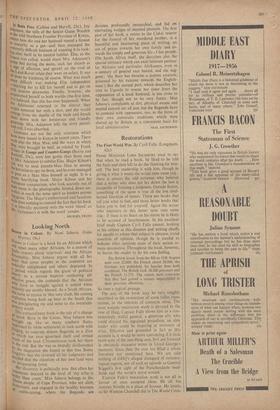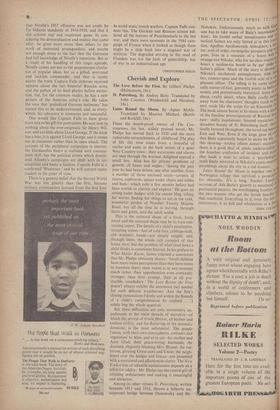Restorations
PRIME MINISTER LORD SALISBURY used to say that when he read a book, he liked to be told the facts and then left to do the thinking for him- self. The best readership is with him, though in giving it what it wants the writer runs some risk : there is always the odd reviewer who believes that a writer who does not lay down the law is incapable of forming a judgment. Outside fiction, something of the same is true of the less intel- lectual function of letters. There are books that tell you what to feel, and those better books that leave you to feel for yourself. Again the writer who ministers to this better taste runs some risk: if there is no heart on his sleeve he is likely to be accused of heartlessness. In his excellent brief study Captain Cyril Falls cannot, looking at his subject at this distance and writing chiefly for people to whom that subject is obscure, avoid assertion of opinion, though he is careful to indicate what opinions must of their nature re- main speculative. Throughout the book, however, he leaves the reader to do his own feeling.
The British losses from the 8th to llth August• were over 22.000; the French about 20.000; the German, not published, far heavier than both combined. The British took 18,500 prisoners and the French 11.373. The victors were conscious that they had gained a success unparalleled in their previous offensives.. . .
So runs a typical passage.
The aim of the book may be very roughly described as the re-erection of some fallen repu- tations, in the interests of common sense. The most notable restoration work is devoted to the case of Haig. Captain Falls shows him as a con- summately skilful general, a generous ally who could discard his ingrained prejudices, an able leader who could be inspiring at moments of crisis. Effective and grounded in fact as this account is, it would be more convincing if it took more note of the anti-Haig case, first put forward in obviously excessive terms in Lloyd George's memoirs. Since then the case has filled a whole literature not mentioned here. We are told nothing of GliQ's alleged disregard of meteoro- logical reports, nor of such an episode as General Kiggell's first sight of the Passchendaele mud- fields and 'the world's worst wound.'
Captain Falls's restoration work is not all in favour of once accepted ideas. He all but restores Nivelle to a place of honour. He insists, as Sir Winston Churchill did in The World Crisis,
that Nivelle's 1917 offensive was not costly by the hideous standards of 1914-1918, and that it did achieve real and important gains. In con- sidering the demoralisation and mutiny that came after, he gives more stress than others to the work of interested propagandists, and maybe not enough stress to the fact that the Germans had full knowledge of Nivelle's intentions. But as a result of his handling of this tragic episode, Nivelle comes out not as the preposterous charla- tan of popular ideas; but as a gifted, overrated and luckless commander, and that is surely nearer the truth. Captain Falls endorses received opinion about the last Imperial Russian army and the pathos of its final glories before extinc- tion, but, for the common reader, he has a new picture of the Austrian army's role. He takes the view that 'prejudiced German testimony' has caused this to be underestimated, and, as every- where, his advocacy is strenuous and successful.
One would like Captain Falls to have given more rein to his gift for portraiture. He says next to nothing about the ever-enigmatic Sir Henry Wil- son, and too little about Lloyd George. If the book has a bias, it is against Lloyd George, and it comes out in omissions rather than in open attack. The account of the peripheral campaigns is uneven; the Dardanelles fiasco is outlined with consum- mate skill, but the political events which domin- ated Allenby's campaigns are dealt with in too simplified and hasty a fashion. Captain Falls is a confirmed 'Westerner,' and he will convert many readers to his point of view.
There is a general belief that the Second World War was less ghastly than the first, because military commanders learned from the first how to avoid static trench warfare. Captain Falls con- tests this. The German and Russian armies suf- fered all the horrors of Passchendaele in the last war, and there were moments in the 1944 cam- paign of France when it looked as though there might be a slide back into a stagnant war of attrition. The degraded striving in the mud of Flanders was not the fault of generalship, but of war in an industrialised age.
CHRISTOPHER SYKES











































 Previous page
Previous page